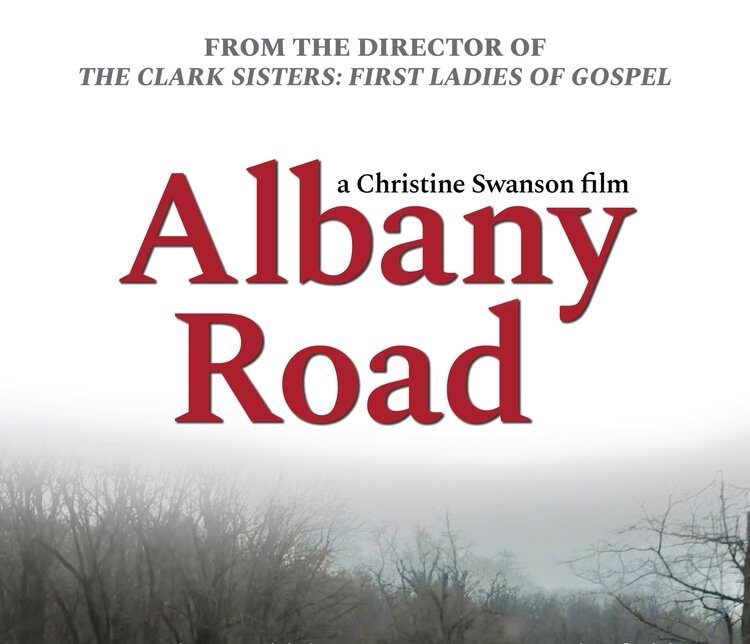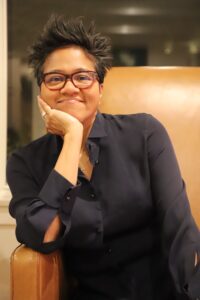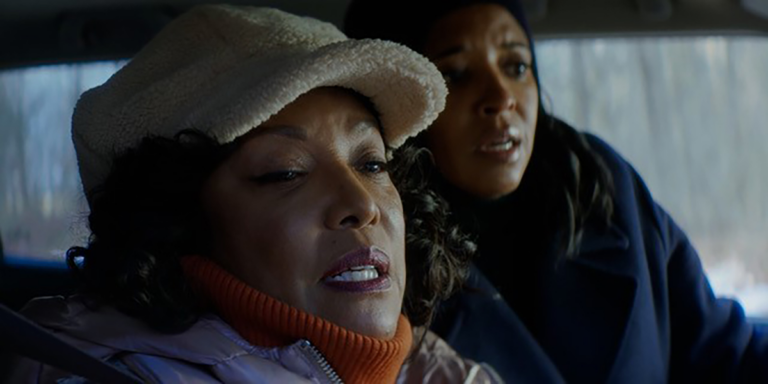CHAMPAIGN – Christine Swanson, has been writing, directing, and producing films for over 25 years, but her latest film was shot primarily in Champaign, IL. Albany Road premieres at Ebertfest this Saturday, April 20th, at 4pm at the Virginia Theatre. Swanson spoke with Morning Edition host Kimberly Schofield about the film, what it’s like to be a Black woman in the entertainment industry, and her thoughts on Champaign.

Kimberly Schofield: What inspired you to write this work? Because you have a lot of work under your belt with Faith Filmworks? Is that right?
Christine Swanson: Yes, that’s my company with my vet, we run with my husband, who is a producer. And we’ve been making projects together since 1997.
KS: And have you done a holiday movie before? Or is this a film that just happens to take place during holiday times?
CS: No, I don’t think I I have done a holiday movie. But what I wanted to do was make a non-Christmas Christmas movie. And by that I mean, it simply takes place in a wintertime. And there are Christmas decorations in the background, but you never really see the color red. And nobody says it’s Christmas. It’s more like a winter film.
KS: Was some of it filmed in Champaign?
CS: 90% of it was filmed in Champaign. That’s the funny part of it. When I flew back yesterday to Champaign, through the airport–
KS: Willard airport?
CS: Yes! We shot in that airport for multiple days and I’m looking at it like, this is so surreal. I’m back and I shot in this airport. It looks exactly the same and different at the same time. But what I love is that we shot in an airport, which means that somebody in the city of Champaign, through University of Illinois, was gracious enough to allow us to do that. And I think the proof is in the pudding. And the people of Champaign, if they can come out and see it, will see how beautifully the city shows up in this movie.
KS: Have there been any challenges? I mean, obviously creating a production company and balancing work and balancing a family and anything else that you’d be interested in doing is challenge enough, even though it is fulfilling. Have there been challenges being either a woman or a Black woman in this industry?

CS: Yeah. I feel like the industry is slowly coming along, but I think for a long time, it hasn’t. It hasn’t really serviced or been ready for elevated storytelling with and by Black women. And the irony of it is, Black women in the marketplace always over-perform. But it’s just interesting that the industry as a whole doesn’t service that demographic in a satisfying way consistently. So that’s one of the things that I always set out to do because I can actually…I can direct anybody. When I direct TV, you know, I could be directing a show like MacGyver or FBI or Roswell: New Mexico, I can direct any color on the spectrum, but one of the things that inspired me from filmmakers like Spike Lee and like Charles Burnett is to see our images on screen in a way that was transcendent. And I’m like, “That’s cool.” And there’s a lot that I felt that I have observed in the community of Black people.
And I have to say this…I lived in Korea until I was six. So my mom’s Korean, my dad’s Black. But when I came to America, I couldn’t speak English. So for many years, I just observed behavior. And that is what we love watching on screen is behavior played out. So I’m always kind of reconstructing things that I felt I observed or witnessed and I just want to reflect that back to this community of people that I felt has deeply enriched me in ways that I’ll never be able to express. My parents divorced, and my dad, a single Black man, ended up raising me and my brother. And then we were also raised by my grandmother and her sister. So we’re talking grown women who have already raised their children, who are now taking in orphans, and raising them. So what I witnessed in the Black community was this great wealth of humanity that just went above and beyond what’s normal. And I find that in the images that I see reflected, I’m like, “I don’t see the people that I knew to be real.” And why is that? Because we are not the conductors of our own orchestra. I would just say we should have a balance of storytelling, because that’s democratic. That’s the American way. So I say all that to say, I feel that we’ve only scratched the surface of what’s possible in terms of storytelling that has people who happen to look like us.
KS: Is there something in doing Albany Road or doing Albany Road in Champaign that you really enjoyed? Is there like a specific moment that you remember that you said, “Wow, this is it?”
CS: Well, it’s interesting because we brought a collection of actors, some legends. Lynn Whitfield‘s in the movie and she’s a legend. We brought the original Angelica Schuyler from Hamilton, Renee Elise Goldsberry.
KS: I think she performed at the Virginia Theater.
CS: She did! Then all the supporting cast, you know, nobody was really from here. So it’s the idea of building community where you’re at. So there’s this nostalgia that I am ascribing to my Champaign experience. And by the way, it was cold. Like, it was so cold. We were here in February and March. It was freezing and all of the hardships that came with that, it bonded. This idea of this kind of artificial hardship…it’s artificial, because we know after we finish shooting, we’re all going to be in our warm beds and comfortable, but this kind of artificial hardship in some city called Champaign, and most people have never been here before, and it’s this collective effort that we put together in Champaign that solidified our consciousness in a way that we were like, “We’re going to go all out and do what we can to make this movie soar.” And I feel like that’s the input that was given during that time reflects in the output and the final film. It was just a fun time and maybe I live for those kinds of experiences. I love making movies and I love building a community out of nothing…to do something great to give back to the community.
The screening of Albany Road at Ebertfest is followed by a panel discussion with filmmakers Christine and Michael Swanson, and actors Renee Elise Goldsberry and Lynn Whitfield.

